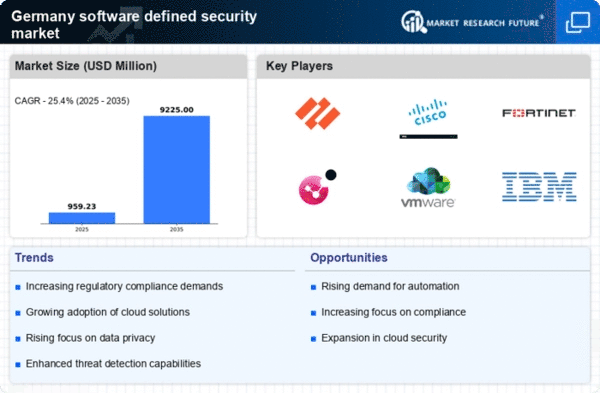Shift Towards Remote Work
The shift towards remote work in Germany has created new security challenges, thereby propelling the software defined-security market. As more employees work from home, organizations must ensure that their security measures extend beyond traditional office environments. In 2025, it is estimated that remote work will account for 40% of the workforce in Germany, necessitating the adoption of flexible and scalable security solutions. This trend indicates a growing reliance on software defined-security technologies that can provide secure access to corporate resources from various locations. The market is thus poised for expansion as businesses seek to implement comprehensive security strategies that address the unique challenges of a remote workforce.
Rising Cybersecurity Threats
The software defined-security market in Germany is experiencing growth due to the increasing frequency and sophistication of cyber threats. Organizations are compelled to adopt advanced security measures to protect sensitive data and maintain operational integrity. In 2025, it is estimated that cybercrime could cost businesses globally over $10 trillion annually, prompting German companies to invest heavily in software defined-security solutions. This trend indicates a shift towards proactive security measures, as businesses recognize the need for robust defenses against potential breaches. The urgency to safeguard digital assets is driving demand for innovative security technologies, thereby enhancing the software defined-security market.
Regulatory Landscape Evolution
The evolving regulatory landscape in Germany is significantly influencing the software defined-security market. With stringent data protection laws such as the GDPR, organizations are increasingly required to implement robust security measures. Compliance with these regulations is not merely a legal obligation but also a competitive advantage. In 2025, it is anticipated that compliance-related investments will account for approximately 30% of total IT security budgets in Germany. This regulatory pressure is driving organizations to adopt software defined-security solutions that can ensure compliance while providing enhanced protection against data breaches. Consequently, the software defined-security market is likely to see sustained growth as businesses navigate these complex regulatory requirements.
Digital Transformation Initiatives
As German enterprises undergo digital transformation, the demand for software defined-security solutions is surging. The integration of digital technologies into business processes necessitates a reevaluation of security frameworks. In 2025, it is projected that 70% of organizations in Germany will prioritize digital security as part of their transformation strategies. This shift is likely to create a substantial market for software defined-security solutions, as companies seek to ensure that their digital infrastructures are secure and resilient. The software defined-security market is thus positioned to benefit from this ongoing transformation, as organizations invest in comprehensive security measures to protect their evolving digital landscapes.
Increased Investment in IT Infrastructure
In Germany, there is a notable increase in investment in IT infrastructure, which is positively impacting the software defined-security market. Organizations are recognizing the importance of modernizing their IT systems to enhance security and operational efficiency. In 2025, IT spending in Germany is projected to grow by 5%, with a significant portion allocated to security solutions. This investment trend suggests that businesses are prioritizing the integration of advanced security technologies into their IT frameworks. As a result, the software defined-security market is likely to benefit from this influx of capital, enabling the development and deployment of innovative security solutions that address emerging threats.

















